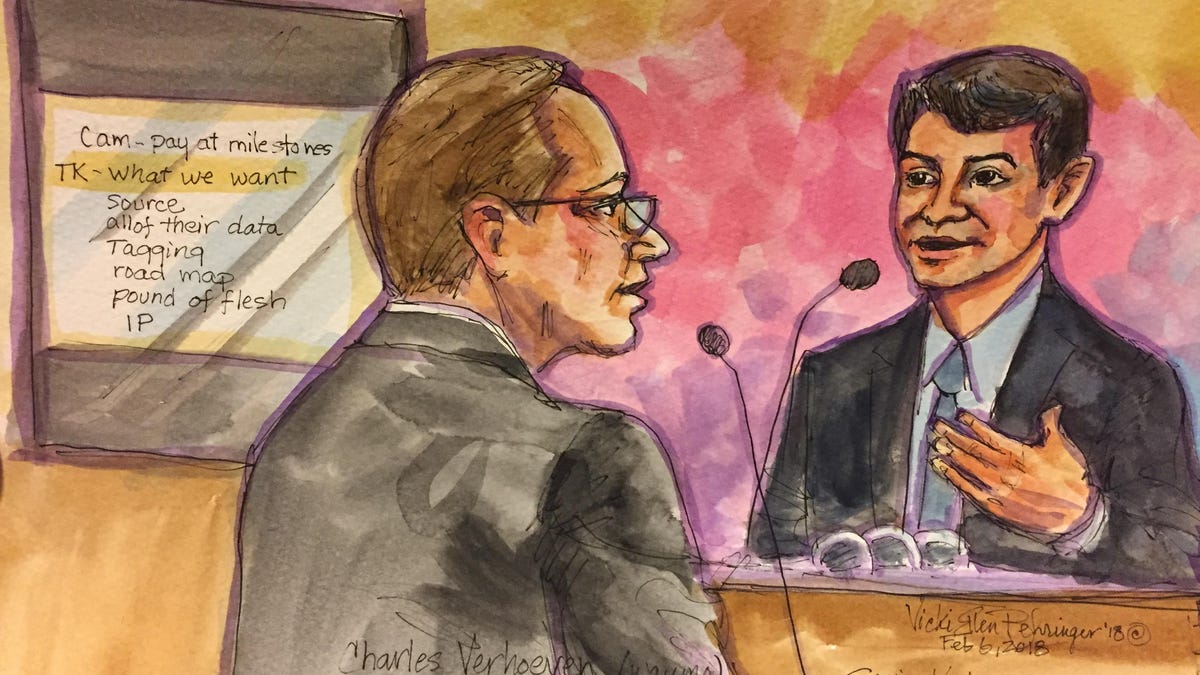Waymo v. Uber trial: Kalanick wish list included 'pound of flesh'
In day two of the trial over self-driving tech, Waymo presents Uber's ex-CEO with notes that aim to show he was also after intellectual property.

Former Uber CEO Travis Kalanick took the stand Tuesday as the second day of the Waymo v. Uber trial focused on how the ride-hailing company built its self-driving car unit.
Wearing a dark suit with a royal blue tie, Kalanick walked swiftly through the packed courtroom to the witness stand. He raised his right hand, swore to tell the truth, sat down and took a swig of water.
Former Uber CEO Travis Kalanick said Anthony Levandowski "was very adamant about starting a company and we were very adamant about hiring him."
Kalanick's presence in San Francisco's District Court for the Northern District of California was highly anticipated. He is one of the most high-profile executives to speak at what is already one of the most-watched tech lawsuits in years. Alphabet's self-driving division, Waymo, sued Uber last year, accusing the ride-hailing company of stealing trade secrets to develop its own self-driving car program. If Uber loses, it may be forced to pay nearly $2 billion in damages and halt its self-driving program.
During Kalanick's testimony, Waymo attorney's showed him notes from a meeting held in late 2015 with members of Uber's self-driving project. The notes included a wish list that read: "source, all of their data, Tagging, road map, pound of flesh, IP."
"Did you tell the group that what you wanted was a pound of flesh?" the attorney asked.
"I don't know specifically," Kalanick responded, sitting straight-backed and leaning forward to speak into the microphone. "It's a term I use from time to time."
The trial kicked off on Monday with Waymo's lawyer Charles Verhoeven describing Uber as a cut-throat company that would do anything to win, including stealing from competitors and breaking the law. At the heart of the case is Waymo's former star engineer, Anthony Levandowski, who allegedly pilfered about 14,000 files from the company before he quit in early 2016 to form his own self-driving truck startup, Ottomotto, which Uber later acquired.
Levandowski has a long history of working on self-driving cars. He joined Google as a software engineer in 2007 and helped pioneer the tech giant's self-driving-car project. Much of his work revolved around Lidar, formally known as "light detection and ranging." Lidar is one of the main technologies used in both Waymo and Uber's self-driving cars and lets vehicles "see" their surroundings and detect traffic, pedestrians, bicyclists and other obstacles.
For this case, Waymo must prove Uber not only got its hands on the 14,000 files, but also that it used them to develop its own autonomous vehicle technology.
Uber says it never touched the files Levandowski allegedly stole and its motive to get him on the team was to acquire one of the world's top self-driving car engineers. Lawyers also said Tuesday that Waymo's trade secrets didn't appear to be that important since it didn't file patents for those inventions.
Kalanick testified that he began talks with Levandowski in 2015. He said Levandowski was "very adamant about starting a company and we were very adamant about hiring him."
"I wanted to hire Anthony [Levandowski] and he wanted to start a company," Kalanick said. "I tried to come up with a situation where he'd feel like he started a company, and I'd feel like I hired him."
Kalanick said he wanted the code name for buying Levandowski's company to be "Project Dollar Sign."
The Waymo attorney directed Uber's former CEO to notes where he mentioned having a "jam session" with Levandowski. When asked what that meant Kalanick said it referred to a jazz ensemble. "A jam sesh is when you get a bunch of interesting people in a room."
During the jam session with Levandowski, Kalanick said they discussed how they were going to work together and wrote on a whiteboard: "laser is the sauce." Kalanick confirmed that meant lasers are key to making self-driving cars work.
Earlier Tuesday, Waymo's vice president of engineering Dmitri Dolgov, a forensic analyst for Waymo Gary Brown, and Waymo hardware engineer William Grossman were also called to the stand. Their testimony was followed by a video deposition of John Bares -- the former head of Uber's self-driving program -- who said Kalanick wanted to hire Levandowski despite potential legal issues.
Bares notes from a January 2016 meeting, shown to the court, say, "[Travis Kalanick's] advice of legal: tell them we are going to do it, ask how to minimize risk, minimize pain."
Read about Kalanick's second day of testimony here.
Update, 3:41 p.m. PT: Clarifies the damages Waymo is seeking in the lawsuit.
Update, 6:12 p.m. PT: Adds more background information.
CNET Magazine: Check out a sample of the stories in CNET's newsstand edition.
Life, disrupted: In Europe, millions of refugees are still searching for a safe place to settle. Tech should be part of the solution. But is it?



